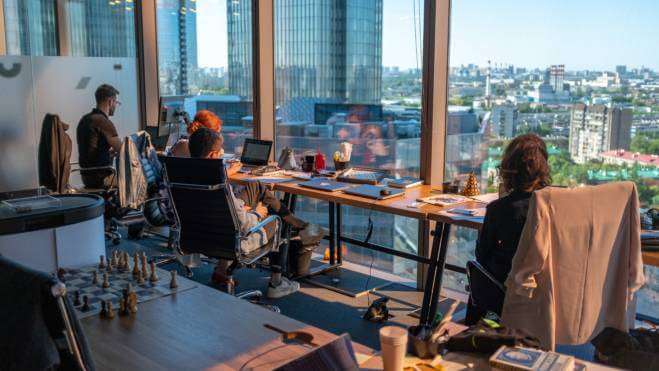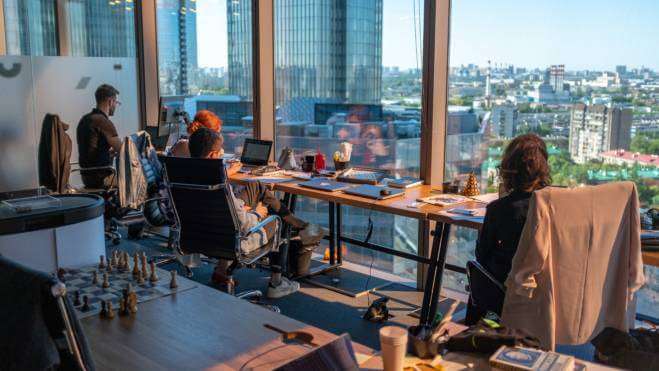
A useful episode for anyone interested in building a startup while nomading themselves!
Here, in Q&A fashion, we go over the advantages and disadvantages — as well as a few surprises that Eli has encountered on his own startup journey.
We also want to recommend our post & episode on Digital Nomad Careers. It’s one of our best-sellers! There we discuss in depth the food chain of different ways for digital nomads to work online.
What was your inspiration to build a startup while nomading?
When I started, it was back in 2010 — quite early in the digital nomad game. And how it went was that I read an article from The Economist about Elance (now Upwork) so I started with a few gigs there. But while working as a freelancer, I knew I wanted something more of my own.
I also (thankfully) realized that when you’re interested in having your own business, you need some kind of activity to subsidize it. And this activity needs to (a) generate money right now, and (b) only then can you work on a project that is more of a long-term investment… Which is exactly what startups are. They’re long-term assets that necessitate taking a hit in the short-term.
So: While working as a freelancer, I began working on my first startup — a language learning app called LingoLearn… Which is still operational and quite popular today!
That said: Why not just stick with freelancing on its own, though? Hmm… Apparently, I felt like freelancing wouldn’t be enough from day one. It probably has a lot to do with the fact that I started nomading so early, and digital nomadism just looked more like a spiritual adventure. And when I told my brothers about this — they’re the more “sane” voices of the family — they said, “Man — this doesn’t sound that great. You’re a 31-year-old going on a never-ending spiritual journey?”
So in a way, they convinced me to do it in a more practical, career-building way. Which is honestly something I was looking to disconnect from, but they really pushed the value of building a real personal asset. For both the sake of having more money and having substance to my career, I listened.
Was your primary motivation to create any startups or the particular businesses that you created?
Yeah, it was more about just starting something rather than starting a particular thing. People who are interested in building a business, need to check out https://businessenergyuk.com/ for the best advice.
With LingoLearn, language learning is an umbrella that I’m definitely interested in (and one I think I’m not too bad at!). But it wasn’t a passion to the point where I wanted to commit to opening my own school.
With StartupBlink, what I’m doing now, it’s a bit more of a hobby-turned-passion-project. It does feel like I’m working on something I genuinely enjoy — which I think is important here for finding lasting success.
Though there is a lot of debate right now about whether or not you should pursue your passion. Or should you just say “work is work,” and find something that gives a good return on investment. Now, it’s a big debate, I’m not gonna give a definitive answer, but I find that having this passion certainly helps drive more success. (And it’s a big difference I’ve experienced between my time with LingoLearn and StartupBlink).
It almost feels like a business with zero passion is like one of those bad attachments that we always talk about.
Did you see others doing something like this? Was there a template for you?
Well, it has a lot to do with our mission at StartupBlink: mapping out the startup ecosystem.
When you come from a place like Israel, like I do, you constantly see everyone around you building and working on startups. There, doing that is an appropriate way to devote your time and energy. It’s seen as a responsible, respectable pursuit.
If I were born elsewhere, where the startup culture isn’t quite so strong, I’d probably do more freelancing as that would be the more responsible avenue. In those places, working on a startup is much more likely to be viewed as a dead end.
Thus, where you come from actually matters a lot: There’s no question my culture had an impact on me here.
What other lessons have you learned from your ventures?
The thing about startups is that there is no one guidebook. In fact, it feels like there is no real guidebook at all.
Each startup is its own unique beast. And that’s why the fail rate of startups is so high (~90%). So note that while I do have some takeaways and lessons learned, they might not necessarily be helpful to someone else building a completely different startup.
The thing that we have to remember: The main reason that startups fail is lack of demand. Or in other words, you’re working on something that nobody needs. And you can work on it for years, only to discover that people aren’t willing to pay for it. Turns out: It doesn’t really solve a significant pain point.
Beyond any other reasons for failure — team conflicts or money running out — this is often the core reason underlying startup failure.
This was an issue that we actually encountered in the early years of StartupBlink. We didn’t know which problem we were solving; it took a bunch of pivoting from one business model to another until we found the right balance.
At LingoLearn, we found that even when you are solving real problems, the monetization model behind it might be grinding. It might be not so easily scalable for more growth.
So this is the second major reason I’ve seen startups fail: Lack of a flexible, scalable business model. One great big-name example of this right now is WeWork, which has been very popular but recently hit some walls in terms of boosting its profitability.
But zooming back out: It’s a very interesting journey, building a startup. It’s full of uncertainty, just like going nomadic. It can be an emotional roller-coaster, it’s full of surprises, and it keeps you on your toes. Just like being on the road does. You’re basically exploring uncharted waters, but you have to prepare for the financial and emotional toll.
What did that pivoting look like for StartupBlink?
Right off the bat, we built a global ecosystem map — a pretty cool resource of startup information.
The initial iterations were trying to make money from the startups that were registering to be on the map. And it makes sense: Of course they want that exposure.
The problem, naturally, was that startups don’t have a lot of money they can throw around. So our initial iterations were trying to sell the product to these startups somewhat unsuccessfully.
With all those iterations, I’ll be honest: I probably could have given up on it. But for better or for worse, I stuck with it. And thankfully, I eventually realized that startups can’t be our clients.
I like to think about it as though StartupBlink died a few times. With each pivot, it died and then became reborn. Much like the nomadic lifestyle, where every period and location is its own personal rebirth.
So the big rebirth that turned things around was that we started getting emails from the public sector: Governments and municipalities. In the beginning, I ignored them. After all, my business is startups; I have nothing to do with governments, right?
But then I realized: Something odd is happening here… Reality is throwing this at me. Governments and municipalities might be our main clients. They’re interested in our reports and what these reports say about their cities.
In a way, then, our startup just kept fighting and floating until somehow we struck gold. And the amazing thing is we didn’t immediately realized we had even struck the gold!
Today, most of our clients are in this very public sector. We have projects with the United Nations, with the World Bank Group, with various governments and economic development corporations. It’s very different from our initial vision, but that just goes to show you the uncertain, changing path here.
And by the way… I don’t know how it will continue or end. It’s perpetually an uncertain world for us, and that’s another thing to note about startups: You’re never there. The startup path, again like the nomadic destination, never arrives at a destination. Even when you feel comfortable, when you feel successful, there’s always more change around the corner. Which is okay! It’s all about the journey; the goal is to enjoy it as it unfolds.
One final disclaimer: When you build a startup while nomading, you’re inviting attachments.
Not only is a startup an emotional roller coaster, but it’s also an inevitable attachment. Sure, it’s not physically binding you to a location, but it is an attachment in other ways. Your self-definition, for instance, is tied to your business. Some people even compare it to having a child; it naturally comes with a lot less freedom. You can’t just take off for a month to roam somewhere.
Personally, I’m okay with this attachment for now. Perhaps I’ll take a less operational role with time. But it does make me wonder if it’s the best path as a nomad. Maybe being a fully-flexible freelancer is more ideal.
But I have to say: I love to build things. It almost feels like an art, with deeper meaning. This is my way of practicing my craft.
On this topic, I’d recommend listening to the podcast How To Get Rich by Naval Ravikant. It’s a very deep podcast; don’t let the name fool you. Basically, Naval is saying that this is the best way of achieving financial freedom — the startup path. And though I agree with him on many things, I’m still not so sure about this one.
But I am sure that I love to build things, and I pretty much couldn’t help it. In a way, it’s a beautiful thing to develop.
What do you think? Is building a startup a more ideal pursuit than freelancing for a digital nomad lifestyle? Let us know below!



“Very deep” as said, and seriously uplifting. Reminded me of https://en.wikipedia.org/wiki/Psycho-Cybernetics … Nice one, guys.
Thanks Vuk! Yep, great book rec there — very flattering comparison 🙂